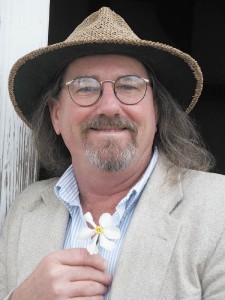Allan Armitage and Felder Rushing on Gardening in an Era of Climate Change
 by Jonah Holland, PR & Marketing Coordinator, Lewis Ginter Botanical Garden
by Jonah Holland, PR & Marketing Coordinator, Lewis Ginter Botanical Garden
I just got off the phone with Allan Armitage, one of our keynote speakers for our anniversary symposium, Gardening in an Era of Climage Change (Feb. 4, 5 & 6). I’m really looking forward to his presentation next Wednesday, but I wanted to get a sense of what he was going to talk about before- hand. I asked him what the biggest changes in the industry have been in the past 10 years. What he told me was very interesting, “People are gardening less. Gardening is a four letter word because gardening is associated with work and landscaping is associated with beauty. The perception of gardening has changed he said, it has had a ripple affect through the garden industry.”
So of course, I had to ask, what is the difference between gardening and landscaping. Gardening is do it yourself, he said and landscaping is hiring someone to do it for you. “Instant landscapes are great, but when there are fewer people gardening than that means fewer people buying plants and fewer people buying plants mean less plants and it goes up and up and up. There is a shift away from gardening and garden centers.”
He also focused on some of the concerns of the gardening industry, “Gardening used to be thought of as recession-proof, you’d at least buy something, but now it’s known it’s not recession proof. The industry is really scared because of the economy,” he said, “and the industry is worried.”
And of course I had to ask him what plants he’s excited about these days. He says he’ll be talking about quite a few, and he’ll bring some with him, but he gave me a teaser of a low maintained annual and a perennial that he is recommending right now.
Annual: Ornamental Tapioca (yes, as in the the pudding!)
Perennial: Ivory’s Prince Hellebore
Our keynote speaker on Thursday, Felder Rushing, preferred to reply to my questions via email. From his responses I hope you can tell what a colorful and charismatic speaker he is. Tom Brinda and Lynn Kirk, two Lewis Ginter staff members, wrote about him briefly last year and described him this way: “Though trained as a traditional horticulturist, Rushing’s philosophies are far from the norm. Rather than concentrating on the do’s and don’ts of gardening, his focus is rooted in enjoyment. He encourages folks to temporarily throw horticulture’s rules aside “in order to enjoy not the products of, but rather the journey of gardening.”
 OK Felder, take it away:
OK Felder, take it away:
My geekiest garden innovations are my “green roof entry arbor” and my “rain harvester porch roof” – you can see them both at my website (links on the left hand side of the page)… and my new bottle tree link is a KILLER, with history and lore, and over 100 images (including some of my own – i have 11 bottle trees in my own garden).My main tip for new gardeners is to create a SMALL raised bed area – 4 or 5 feet wide by however long – using anything recycled to shore up the sides (reused bricks, broken concrete, old dishes from a garage sale, upended wine bottles from the recycling center), or even pressure-treated boards (the new kinds are SAFE for herbs and vegetables – I am very sure of this), and then partly sinking a large container or two in the centers (even old tires, like at the kids garden at Lewis Ginter), and planting a few culinary herbs, some easy vegetables, and a few flowers. This will build confidence, and if something doesn’t make it, so what? just replant that small area…Another tip is on how to lose part of the lawn without a lot of work: cover the area with a couple or three layers of flattened cardboard (newspaper blows away, cardboard lasts longer), then cover that with leaves, grass clippings, and mulch to make it look nice. throw on some natural fertilizer such as cotton seed meal, which “feeds” worms the protein they need to get big and beefy, and within a few months the area will be completely weed- and grass-free and ready to plant – the worms will have done all the work. really. to make it look better, edge around it with a shovel (a day or two after a rain, when the digging is easiest).
Hope you can make it to our symposium on Feb. 4, 5 & 6 to hear these guys and many other great speakers including James Urban, Richard Bir and Kennon Williams. Registration will close at the end of day on January 30th. The full agenda is here, plus remember Friday will be pesticide recertification day, which is good for 2 years.